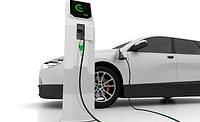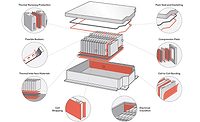Departments of Energy and Transportation Launch Joint Office for Electric Vehicle Charging Network
The network will focus on filling gaps in rural, disadvantaged, and hard-to-reach locations.

U.S. Secretary of Energy Jennifer M. Granholm and U.S. Secretary of Transportation Pete Buttigieg recently signed a memorandum of understanding to create a Joint Office of Energy and Transportation to support the deployment of $7.5 billion from President Biden's Bipartisan Infrastructure Law to build out a national electric vehicle charging network. The network will focus on filling gaps in rural, disadvantaged, and hard-to-reach locations, a critical component of the President’s plan to accelerate the adoption of electric vehicles, address the climate crisis and support domestic manufacturing jobs. President Biden’s Bipartisan Infrastructure Law directs both agencies to collaborate on new programs and initiatives, including the new joint office that will support the transition of the nation's transportation systems, which reportedly accounts for 29% of all U.S. carbon pollution, to electric vehicles and other zero-carbon technologies.
“We are embarking on a transformative path to modernize the way we get to around in this country, making sure all Americans have the option to choose electric vehicles and spend less at the pump while making our air healthier,” said Secretary Granholm. “Our two agencies will work together to deliver on President Biden's historic investments in the Bipartisan Infrastructure Law, starting today with a joint project to build hundreds of thousands of electric vehicle charging stations, to tackle the climate crisis and create manufacturing and construction jobs at the same time.”
“Transportation is responsible for the most greenhouse gas emissions of any sector in our economy—so it can and must be a big part of the solution to the climate crisis,” said Secretary Buttigieg. “With this announcement by DOT and DOE, we are taking a big step forward on climate by helping make the benefits of EVs more accessible for all Americans.”
The Joint Office will help to accelerate effective deployment of a convenient, reliable, affordable, and equitable national network of charging stations. The office will provide technical assistant to states and localities so that they can strategically build electric vehicle charging stations and other infrastructure. This assistance will include helping states develop comprehensive plans for charging station networks to guide the implementation of the $7.5 billion program.
Both agencies are tasked with implementing investments in zero-emission vehicle passenger, transit and heavy-duty vehicles that create cleaner and more affordable transportation options for. President Biden signed an executive order in August setting a national goal of half of all new vehicles sold in the United States being electric by 2030. The early work of the Joint Office of Energy and Transportation will be largely centered on EV charging provisions of the Bipartisan Infrastructure Law, including:
The Joint Office will provide technical assistance and analytical support to states as they develop electric vehicle charging plans and support career training and certification programs.
Learn more at www.energy.gov and www.transportation.gov.
Looking for a reprint of this article?
From high-res PDFs to custom plaques, order your copy today!





